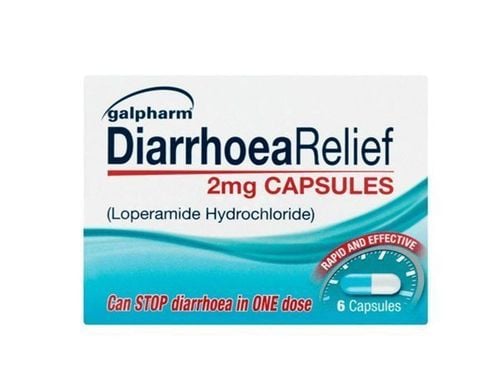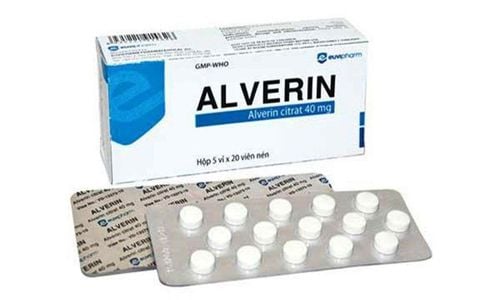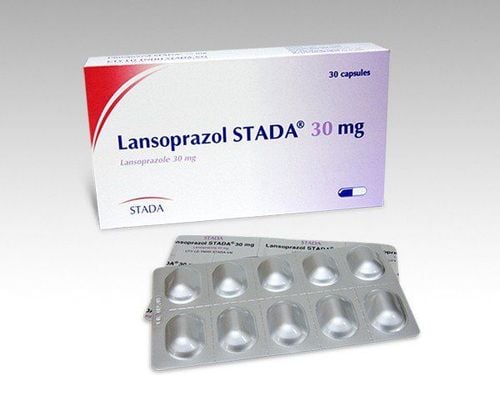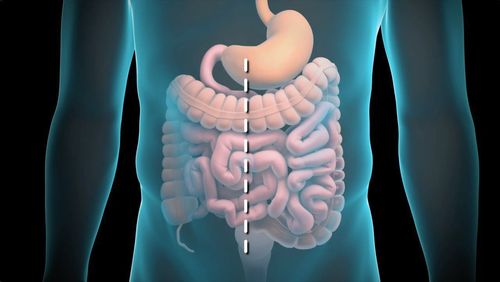This is an automatically translated article.
Most babies experience regurgitation, but when this is accompanied by health problems such as poor weight gain, it can be a symptom of gastroesophageal reflux disease in infants. (GERD). Not only that, this condition can also happen to older children.
1. Gastroesophageal reflux condition in infants
It's perfectly normal for babies to spit up after a feed or even throw up once for no apparent reason. In fact, some children spit up quite often and don't show any symptoms. This is called regurgitation, or infant gastroesophageal reflux. The condition usually begins in about 2 to 3 weeks, peaks at about 4 to 5 months, and it goes away after 12 months.
Also, it can happen in older children too, they may have had it since they were little kids and not bothered as they can develop naturally later on. However, when reflux causes complications, such as poor weight gain, it may be one of the causes of gastroesophageal reflux disease (GERD) and requires medical treatment.
2. Symptoms of GERD in Children

Trẻ bị đau bụng có thể là dấu hiệu trào ngược dạ dày thực quản ở trẻ nhỏ
The baby can have gastroesophageal reflux disease. Here are some signs of GERD in infants and young children:
Discomfort with regurgitation Discomfort after eating Lying on your back during or immediately after eating Cough or vomiting while feeding Poor weight gain Loss of appetite or loss of appetite Colic Abdominal pain Repeated or persistent vomiting Chest pain Heartburns Bad breath Respiratory problems, such as persistent wheezing or coughing at night
3. Emergency and needing medical intervention

Nếu trẻ nôn ra máu cần gọi cho bác sĩ ngay
If your baby spits up a lot but doesn't seem upset and is gaining weight, you may not need to call the doctor. Just mention regularly with the doctor about your child's frequent vomiting at the next checkup.
When to call the doctor if your baby or toddler has the following symptoms:
Reflux makes your child uncomfortable Reflux affects your baby's weight gain Symptoms GERD Vomiting Blood: A small amount of blood is usually nothing to worry about, but persistent or heavy amounts of blood can indicate a more serious problem, such as a food allergy, upper GI bleeding, or a problem coagulation. Blood in the stool: Possible causes include food allergies, anal fissures, or intestinal infections. Heavy vomiting after feeding: Vomiting can be a sign of pyloric stenosis, a condition that can lead to malnutrition and dehydration Get urgent care if your baby or toddler shows these signs:
Vomiting of bile (green or yellow liquid): This could be a sign that the intestines are blocked. Vomiting what looks like coffee grounds: This could indicate bleeding or ulceration of the esophagus, stomach, or small intestine.
4. Causes of Reflux in Babies and Toddlers
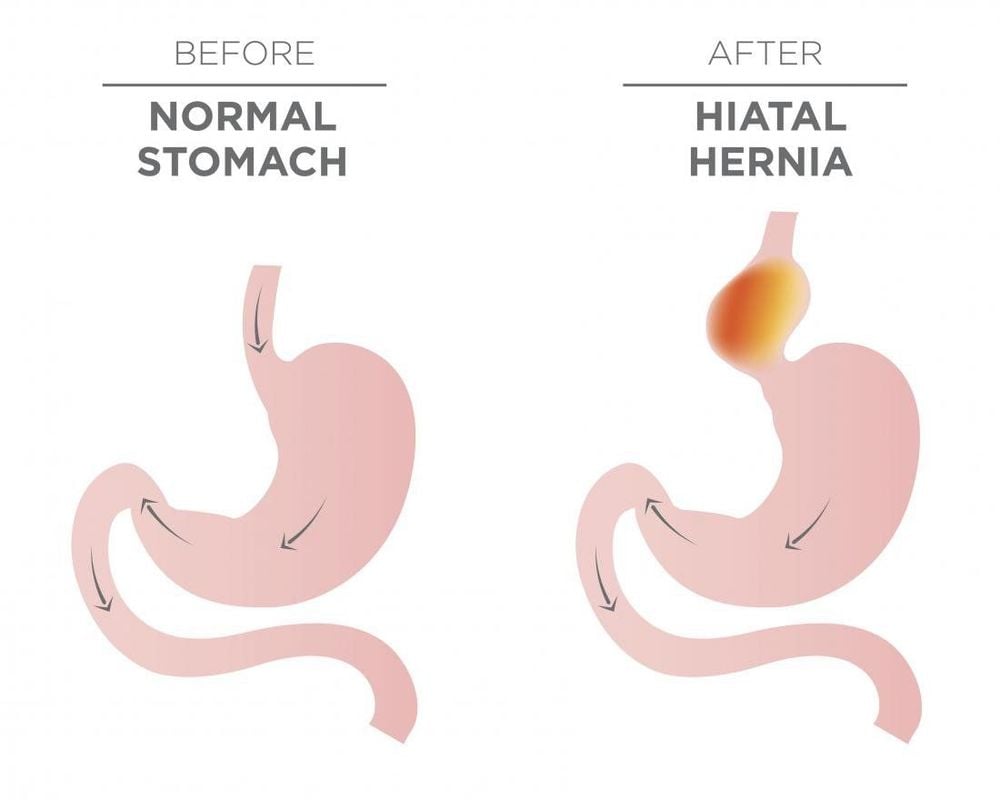
Trào ngược ở trẻ sơ sinh và trẻ mới biết đi ảnh hưởng không nhỏ đến sức khỏe của trẻ
Problems with the lower esophageal sphincter: Your baby may have reflux when the lower esophageal sphincter (the valve that connects the esophagus to the stomach) is weak or not working properly. This allows food and gastric juices to back up out of the stomach and into the mouth. It is also the cause of heartburn in adults. Immature sphincter: Reflux is common in premature infants. As the sphincter matures, it closes unless the baby swallows. Hiatal hernia: Sometimes children with GERD also have a Hiatal hernia, a condition in which a small part of the stomach protrudes through the diaphragm into the chest. (The diaphragm is a muscle that separates the stomach from the chest cavity.) Doctors think that if the hernia allows the upper part of the stomach to protrude, the contents of the stomach can easily back up into the esophagus. However, not everyone with GERD has this problem.
5. Diagnosing GERD in an infant or toddler
The doctor will examine the child and may order some tests, such as blood or urine tests. Furthermore, your doctor may diagnose gastroesophageal reflux disease (GERD) based on your child's symptoms, but may refer you to a pediatric gastroenterologist. Additional diagnostic tests may include:
Upper GI series: This test will use x-rays along with barium chalk to examine the child's digestive tract. X-rays show whether any anatomical problems may affect swallowing or digestion. Endoscopy: Using a small camera that is threaded through the esophagus, stomach, and sometimes the small intestine to look for inflammation or tissue damage. Small tissue samples may be taken for biopsies. Your child will be sedated for this procedure. 24-hour pH probe study: The child will stay in the hospital overnight while a very thin tube is threaded through the nose to the bottom of the esophagus and monitored for 24 hours. This test measures the frequency and severity of reflux episodes and looks at changes related to feeding time and position (such as lying down). Your doctor may also take a tissue sample for a biopsy.
6. Treatment of GERD in infants and children

Thuốc Prokinetics
Your doctor may suggest some things you can try at home to help improve your child's condition. But if these measures don't work, your doctor may prescribe medication or recommend over-the-counter medications such as:
Antacids to neutralize stomach acid H2 blockers to reduce acid production Proton pump inhibitors (PPIs) to reduce the amount of acid in the stomach Prokinetics to help the stomach empty more quickly In some severe cases, Surgery may be advised to promptly manage the child's critical condition.
7. Some measures to help reduce children's reflux symptoms
7.1. Newborn Hold baby upright in your arms. Hold the baby in a more upright position during feeding and for about 20 to 30 minutes after feeding. Don't lay your baby on his stomach or nap, or sit in an infant car seat right after he's finished eating. Give your baby a small amount each time. You can make up for less by feeding more often. Frequent burping. Try burping your baby after each formula feed or after feeding from each breast. And burp well at the end of each feed. Thicken breast milk or formula. Your doctor may direct you to give your baby diluted formula first, or to give your baby breast milk or solid formula with some infant cereal. This may require a wider hole in the nipple or a variable flow to allow thick liquids to flow through. However, you should only do this under a doctor's supervision because adding cereal to the liquid in the jar can increase the risk of choking or excessive weight gain. While you may have heard that putting your baby to sleep on his or her side can help relieve GERD symptoms, these are not safe sleeping positions because they increase the risk of SIDS or suffocation. Always place your baby on his or her back to sleep on a firm sleep surface, free of soft furnishings and bedding.

Hướng dẫn vỗ lưng ợ hơi cho bé sau khi bú
7.2. Toddlers or young children Keep meals enjoyable. Try to make sure the child is in a comfortable atmosphere, sitting at the table (not walking around), while he eats. Serve your child small, frequent meals, instead of several large meals. Feed your baby upright and upright for half an hour or so after eating. Do not let your child eat right before bedtime or while lying down. Elevate your baby's head when he's asleep but only if he's over 1 year old 7.3. Children of all ages Track new foods. As your baby starts solids and tries new foods, watch how he reacts to them. Certain spicy or greasy foods, chocolate, tomato and citrus products can make the condition worse. Avoid giving your child foods that appear to predispose him to GERD. Ask your doctor about food allergies. Vomiting more than usual could be a sign of a food allergy, such as to cow's milk protein. If your baby is formula-fed, another, hydrolyzed (non-allergenic) formula can help. If you're breastfeeding, eliminating cow's milk from your diet can help. However, do not change until you talk to your doctor. Avoid exposure to cigarette smoke. Cigarette smoke can increase reflux symptoms. When a child has abnormal signs of health, parents can take the child to Vinmec Health system for timely examination and treatment.
As a key area of Vinmec Health System, Pediatrics Department - Vinmec International General Hospital always brings satisfaction to customers and is highly appreciated by industry experts thanks to the following advantages:
gathers a team of leading doctors and doctors in Pediatrics: including leading experts, with high professional qualifications (professors, associate professors, doctorates, masters), experienced, having worked in different hospitals. big hospitals like Bach Mai, 108.. The doctors are all well-trained, professional, have a heart - reach, understand young psychology. Besides domestic pediatricians, the Department of Pediatrics also has the participation of foreign experts (Japan, Singapore, Australia, USA) who are always pioneers in applying the latest and most effective treatment regimens. . Comprehensive services: In the field of Pediatrics, Vinmec provides a series of continuous medical examination and treatment services from Newborn to Pediatric and Vaccine,... according to international standards to help parents take care of their baby's health from birth to childhood. from birth to adulthood Specialized techniques: Vinmec has successfully deployed many specialized techniques to make the treatment of difficult diseases in Pediatrics more effective: neurosurgery - skull surgery, stem cell transplantation. blood in cancer treatment. Professional care: In addition to understanding children's psychology, Vinmec also pays special attention to the children's play space, helping them to have fun and get used to the hospital's environment, cooperate in treatment, improve the efficiency of medical treatment.
Please dial HOTLINE for more information or register for an appointment HERE. Download MyVinmec app to make appointments faster and to manage your bookings easily.
Reference source: babycenter.com



